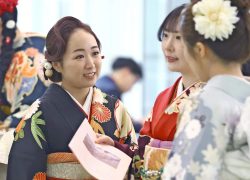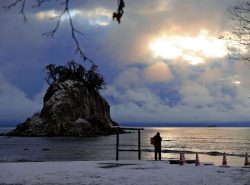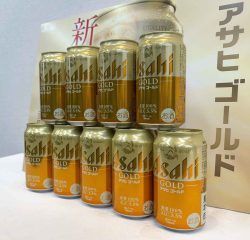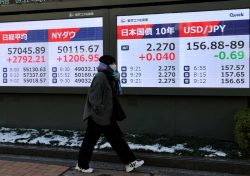Moisturizing Substance Suddenly Forms in Hot Spring Water; Curious Change Occurs in Toyama Pref. Resorts After Earthquake
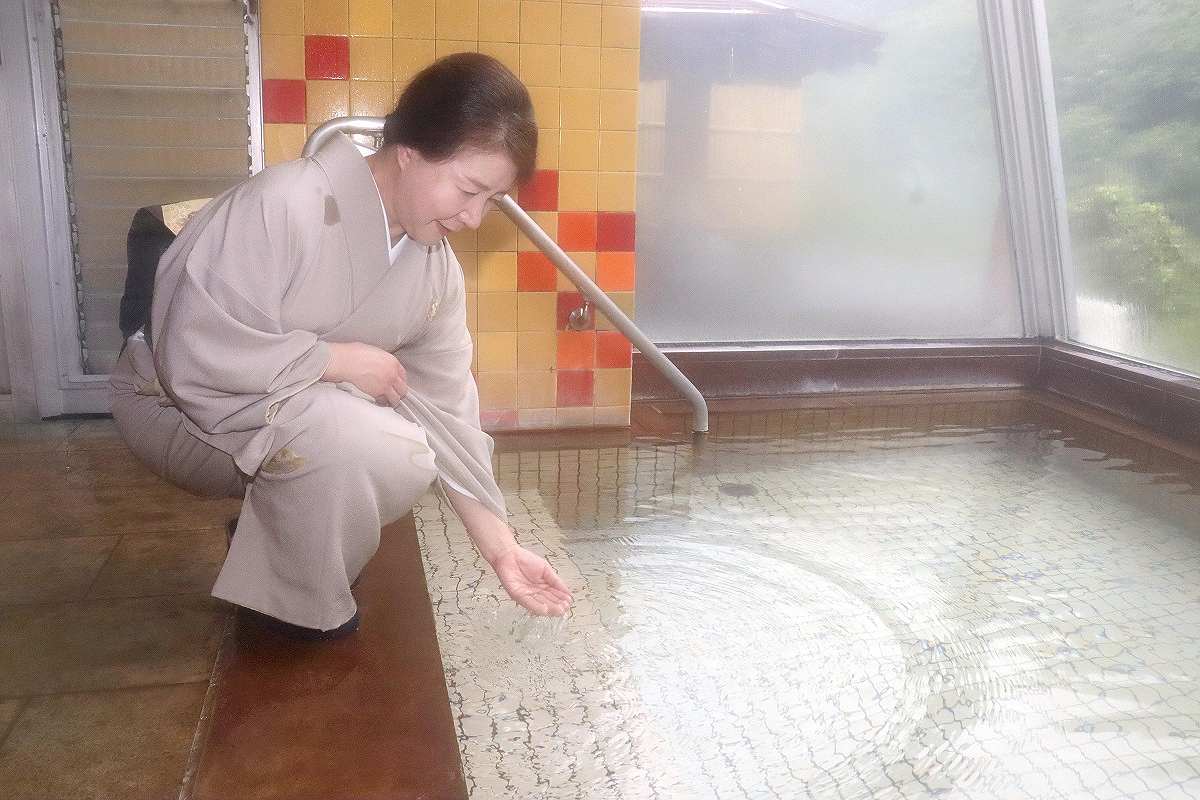
Rumiko Nakajima checks the hot spring water in a bathtub at her Hotel Kurobe in Kurobe, Toyama Prefecture. “The change in the composition of the onsen water has made me feel positive,” she said.
11:36 JST, June 12, 2024
KUROBE, Toyama — Following the Noto Peninsula Earthquake on Jan. 1, the chemical composition of the hot spring water at the Unazuki Onsen resort in Kurobe, Toyama Prefecture, was discovered to have changed, resulting in an increase in a substance that helps moisturize the skin.
“The earthquake caused a lot of cancellations for us, but this is an upside to it. We want to publicize this so we can revitalize our hot spring district,” a source connected to the local inn industry said.
Unazuki Onsen is one of the most popular hot spring resorts in Toyama Prefecture. The spring water is weakly alkaline and the temperature of the spring is about 90 C. The resort first opened in 1923 as a recreational facility for laborers working on a local power plant project.
“I’ve lived at this hot spring resort for more than 20 years, but this is the first time the composition of the water has ever changed. I couldn’t believe the earthquake did this!” said Rumiko Nakajima, 53, the proprietress of Hotel Kurobe (part of Unazuki Onsen), not hiding her surprise.
It was two days after the quake when Nakajima noticed something was different about the hot spring water, she says. When she soaked in it, she felt it was thicker than usual, seeming to wrap itself around her body. A few days later, the tiles in the main bathing areas suddenly began to turn brownish.
Around the same time, the office that manages the resort’s hot spring source heard from many local inns that their hot spring water developed a color and looked unusual.
The inns in Unazuki Onsen get their hot spring water from a roughly seven-kilometer system of pipes linking them to the Kuronagi Onsen hot spring, upstream on the Kurobe River.
According to Fujio Hyakkoku, 55, director of the management office, the water at the spring is clear and colorless, the same as before the quake, and also unchanged in temperature and volume. The pipe system was not damaged by the quake.
He said, “It was a mystery why the color of the water changed after it reached the inns.”
The office then asked the Toyama Prefectural Institute of Public Health to analyze the water’s composition.
A water sample was taken on Jan. 31 at the point where the hot water is distributed to the inns, and the analysis showed that the manganese ion content per kilogram of hot spring water was 0.3 milligrams, 75 times higher than in the previous analysis, performed in 2014. The brown coloration is believed to be caused by a chemical reaction between manganese and the chlorine the inns use to disinfect the water.
The analysis also showed that the level of metasilicic acid, which has a moisturizing effect and is therefore included in skin lotions and similar products, had more than quadrupled to 120.1 milligrams from 26.9 milligrams in 2014.
According to a cooperative association of inns in the Unazuki Onsen resort, reservations for 4,571 people, or 30% of the total number made at its member inns in January, were canceled, resulting in a loss of 95.43 million yen.
Nakajima said with a smile: “Our hot water supply never stopped [after the quake]. We also have some new advertising fodder. I’m a little more positive now.”
There is precedent for the composition of hot spring water changing after an earthquake.
At the Akiha spa Casui in Niigata, crystallized sand-like particles began to accumulate on the bottom of the bathtub after the 2004 Niigata Prefecture Chuetsu Earthquake. An analysis of the water revealed that the concentration of calcium ions and hydrogen carbonate ions had increased significantly.
Hideo Takizawa, head of the research department at the Hot Spring Research Center, Japan, said: “During an earthquake, groundwater pressure can fluctuate, which may affect hot springs. In the case of Unazuki, fluctuations in groundwater pressure may have changed how the water mixes, affecting its chemical composition.”
Top Articles in Society
-

Producer Behind Pop Group XG Arrested for Cocaine Possession
-

Man Infected with Measles Reportedly Dined at Restaurant in Tokyo Station
-

Man Infected with Measles May Have Come in Contact with Many People in Tokyo, Went to Store, Restaurant Around When Symptoms Emerged
-

Woman with Measles Visited Hospital in Tokyo Multiple Times Before Being Diagnosed with Disease
-

Bus Carrying 40 Passengers Catches Fire on Chuo Expressway; All Evacuate Safely
JN ACCESS RANKING
-

Producer Behind Pop Group XG Arrested for Cocaine Possession
-

Japan PM Takaichi’s Cabinet Resigns en Masse
-

Man Infected with Measles Reportedly Dined at Restaurant in Tokyo Station
-

Israeli Ambassador to Japan Speaks about Japan’s Role in the Reconstruction of Gaza
-

Videos Plagiarized, Reposted with False Subtitles Claiming ‘Ryukyu Belongs to China’; Anti-China False Information Also Posted in Japan


